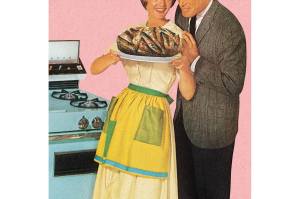My father Richard, who died last month aged 88, was a profoundly impractical man. He could not drive a car, swim, whistle, use a cell phone or computer, or play any ball game apart from croquet. One of his most common remarks was (he could not pronounce his ‘th’s), ‘Vis wretched fing [a door handle, a light switch, a well-wrapped parcel] doesn’t seem to work.’ When younger, he would sometimes go out with an unsafe 1840s shotgun in search of rabbits or pigeons, but the only thing he ever actually shot was his little toe, falling down a bank. Although he was extremely clean, he did not, until he married, know how to wash his hair, and would go to a barber for the purpose. Twenty years ago, he lived briefly in our house in Islington. At breakfast once, he announced he would be out all morning because he had to go to the post office to buy some stamps: he knew only one post office in London — in Trafalgar Square — and was unaware that other shops sell stamps.
This impracticality amounted to a cast of mind. In his five years as a journalist on the News Chronicle in the late 1950s, he never claimed his expenses for taking contacts out to lunch, because he felt it unseemly. I remember him astounding stallholders in the souk in Marrakesh by saying, at the first price they named, ‘Vat sounds very reasonable.’ Although never rich, he started adult life with enough. He then got rid of it with persistence and skill — partly by not understanding the difference between capital and income, partly by thinking food must be bought at Fortnum & Mason, wine at Berry Bros and suits at Welsh and Jefferies, and partly by his unquenchable generosity to family, friends and charity. In his nursing home this year, we found him sitting up in bed with his cheque book, making vague signing movements with his right hand. ‘Vere must be someone I can write a cheque to!’ he cried piteously, worried that he hadn’t been well enough to do so for several days. As he waited to go into theatre for the operation from which he never really recovered, he was busy making wishes for the charities he wished to help. He took so long explaining the glories of Freedom from Torture and the Hebrew University in Jerusalem (he was a lifelong, raging philo-Semite)that we feared he would run out of time to name the other beneficiaries of his by now tiny fortune.
In theory, my father might have seemed like a snob. His first recorded remark, aged two, on being shown a picture of ‘Baby Jesus and his Mummy’ was ‘Where’s his nanny?’ He hated the words ‘radio’ and ‘TV’, so our listings magazine was renamed the ‘Wireless Times’. He refused ever to roll up his shirt sleeves because it looked ‘ravver ouvrier’. I asked him, when he was very ill, if he would like a clergyman to visit him, and he replied, ‘I fink it would be nice to see ve Archbishop of Canterbury.’ In practice, however, Richard treated all human beings the same, always assuming their good nature, their interest and their intelligence. One day, at our house in Sussex, he was helping a 15-year-old girl from the local comprehensive wash up lunch.‘And that,’ I heard him say to her as I entered the kitchen, ‘is why Lazio, alone of the papal states…’ She was flattered by his uncondescending conversation. The hazard lay in the opposite direction — his uncritical reverence for learned persons. Once, after a weary hour with some whiskery professor of his acquaintance, I complained, ‘Goodness, what a bore that man was.’ ‘What can you mean?’ protested Daddy. ‘He’s a great expert on Danish political history.’ Ignorance did trouble him. At breakfast when taking my wife to York races (he loved the Turf), they watched the passing crowds. ‘It’s extraordinary to fink,’ said he, ‘that perhaps a third of vose people don’t know ve date of ve treaty of Westphalia.’
My unworldly father considered himself a failure. He devoted himself to the political party — the Liberals, now the Liberal Democrats — for whom failure is, with a few intermissions, a way of life. He always stood for parliamentary seats he could not win, and I never saw him try to advance his own interest in anything, except perhaps in seeking out good meals. He and my mother lived apart after about 25 years (though remaining married and fond of one another). His lack of the normal acquisitive imperatives which keep the show on the road was maddening for her. In retirement, he was happier than since his Cambridge undergraduate days, because, bolstered by a European parliament pension which even he could not exhaust, he could be benevolent full-time, whether it was taking members of his wider family (a pool of about 35 people) on foreign holidays or campaigning tirelessly for causes he believed were right, such as Remain.
At his funeral in his village last week, it was touching to see how many people understood his truly liberal spirit. As Oliver Letwin said in his perceptive tribute, ‘He was … it has to be admitted, ill-suited to the age in which he lived. But the defect lay in the age, not in him.’ At the wake afterwards, Felix, one of his grandchildren, spoke so well of the letter his grandfather had written to him when he (Felix) had transitioned from female to male. It began ‘Darling Felix’, and then added, ‘I know darlings are normally women but my mother used it for all close family and I follow her example.’ Felix added: ‘Even in my most insecure moments, I would never have thought to take the word “darling” as any sort of invalidation of my gender, which only makes his obvious concern on this point more endearing.’ At Christmas, my father always recited the toast: ‘Here’s to all those that we love, and here’s to all them that love us, and here’s to all them that love them that love those that love them that love those that love us.’ I now understand that he took those words literally, in all their ramifications.
This article was originally published in The Spectator magazine.


















